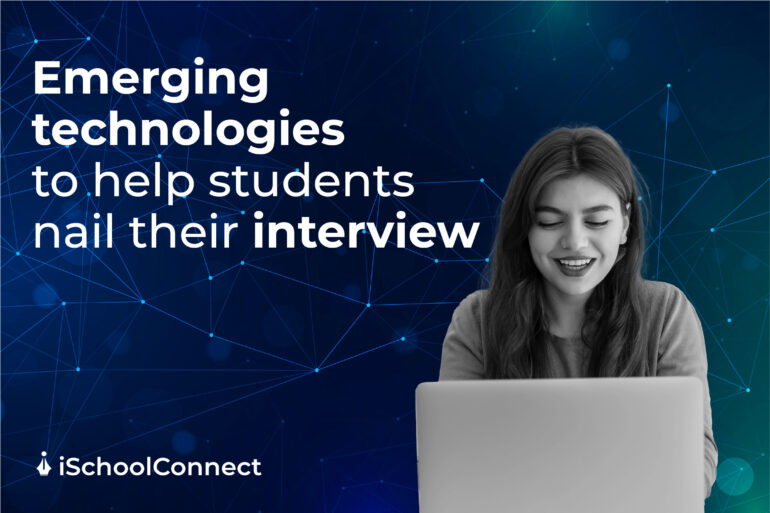Last Updated on December 18, 2024 by iSchoolConnect
With increasing competition in the job market, interviews are getting tougher and tougher to crack. A candidate’s level of preparation and planning can influence their performance in the interview. Using technology, candidates can boost their chances of getting their dream job. These resources can help improve skills and boost candidates’ confidence before interviews.
Interviews are a crucial step in the hiring process since they enable HR experts to get to know a range of applicants. Interviews can also assist organizations in identifying potential workers who are compatible with the objectives and culture of the business. Following are some functions of the interview-
- Evaluate a candidate’s work experience.
- Introduce a candidate to the company.
- Assess a candidate’s hard and soft skills.
- Discover the most qualified candidates.
- Define the position and company expectations.
Here are some tips for candidates to be well prepared for an interview-
- Be on time.
- Know the interviewer’s name, spelling, and pronunciation.
- Have some questions of your own prepared in advance.
- Bring several copies of your resume.
- Have a reliable pen and a small notepad with you.
- Greet the interviewer with a handshake and a smile.
- Expect to spend some time developing rapport.
- Don’t be embarrassed if you are nervous.
- Focus.
- Tell the truth.
- Listen carefully to the interviewer.
- Never slight a teacher, friend, employer, or university.
- Watch your grammar.
- Be prepared for personal questions.
- Don’t expect a job offer at the first interview.
- Close on a positive, enthusiastic note.
- No interview is complete until you follow up with a thank-you note.

img-alt;an-interviewer-taking-the-interview-of-an-interviewee;Unprepared interviewers risk looking uninterested. They may also be unable to analyze applicants properly or persuade them to accept a job offer.
What are the things that every interviewer should take care of?
- Be well-prepared: Unprepared interviewers risk looking uninterested. They may also be unable to analyze applicants properly or persuade them to accept a job offer.
- Be methodical: Unstructured interviews (which feel like free-flowing talks with no goal) can quickly become subjective and unrelated to the job. Unstructured interviews make applicants feel more at ease but do not provide the most significant recruiting decisions.
- Demonstrate concern: Showing concern for applicants improves the candidate experience and strengthens your employer’s brand. Even if a prospect does not receive a job offer, they may have a positive impression of a firm that treated them well.
- Improve judgment: Unconscious biases can confuse our judgment and lead us astray. Good interviewers must overcome their prejudices.
Technologies to help students improve job interview skills
Interview Warmup by Google
Google has been working with job searchers to develop a new tool called Interview Warmup that enables interviewees to practice responding to questions chosen by industry experts and utilizes machine learning to transcribe answers and show where improvements can be made. The responses are recorded by Interview Warmup in real-time so interviewees can evaluate what they said. Additionally, the insights or trends that machine learning has identified can provide information about the responses, such as the phrases used most frequently and job-related terms.
Interviewees can even examine how much time they spend discussing topics like their experience, talents, and ambitions by highlighting the various talking points addressed in each response. Interviewees can answer questions as often as they’d like; no grades or evaluations are given for the answers. It’s the interviewees’ area where they may prepare, rehearse, and settle in.
EDMO Interview Analyzer
EDMO’s Video Interview Analyzer helps interviewees thoroughly prepare for the most critical aspects of their interview by conducting a mock session. When you use the VIA tool, it analyzes significant parameters such as:
- Facial movements
- Emotions
- Behavioral characteristics
Once interviewees are done with a session, they get an instant analysis of the mock interview. This will help them understand which aspects they can improve on to ace the interview.
Monster.com Interviews
This Monster mobile app, one of many readily available, is designed for iPhones and iPads. This tool’s features are broken down into a before, during, and after format. They include recording interviewees’ responses to practice questions, using their device as a mirror for a quick check, locating nearby resources like coffee shops, and writing down their thoughts right away after the interview.
My Interview Simulator
This website can simulate a mock interview with over 100 questions arranged into sets and categories. This system offers audio prompts and text-based hints for answering questions and examples, but it does not store interviewees’ answers. (Note: Flash is necessary for this.)

img-alt;a-girl-preparing-for-her-interview;Interviews are a crucial step in the hiring process since they enable HR experts to get to know a range of applicants.
Interview4.me
Interviewees can create a free account as job seekers to access this online mock interview system. They can record their answers to the software’s five common interview questions using the webcam and microphone on the computer. Interviewees can also record, save, and distribute a 60-second video introduction format on this website using their social networking accounts.
Paid Tools
BigInterview and InterviewStream: For instance, the fee-based tools BigInterview and InterviewStream have agreements with colleges and universities to allow access to students through school-affiliated login processes.
Conclusion
When people reach the interview stage of their job search, they’ve already passed through multiple levels of screening as hiring managers to evaluate the application materials (resume, cover letter, transcripts) to the position’s requirements. However, as the National Association of Colleges and Employers recommends, “Your candidacy will be made or broken during the interview.
The interview is the opportunity to show the company that the candidate has what it takes, that they will fit in and that they are the best candidate for the position. This necessitates cautious planning.” In addition to conducting corporate research, candidates should conduct practice interviews as part of their preparation approach.
Candidates won’t be able to predict all the interviewers’ questions, but they may practice responding to sample questions. Consider how their responses will assist them in conveying their talents, share their success stories, and discuss how they fulfill the needs of the business. Interview practice may help them enhance their abilities and minimize their fear of being interviewed.







